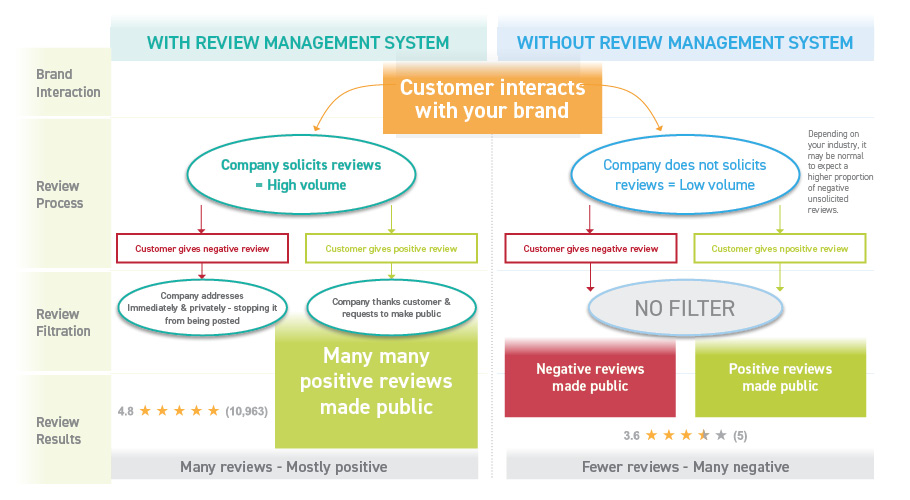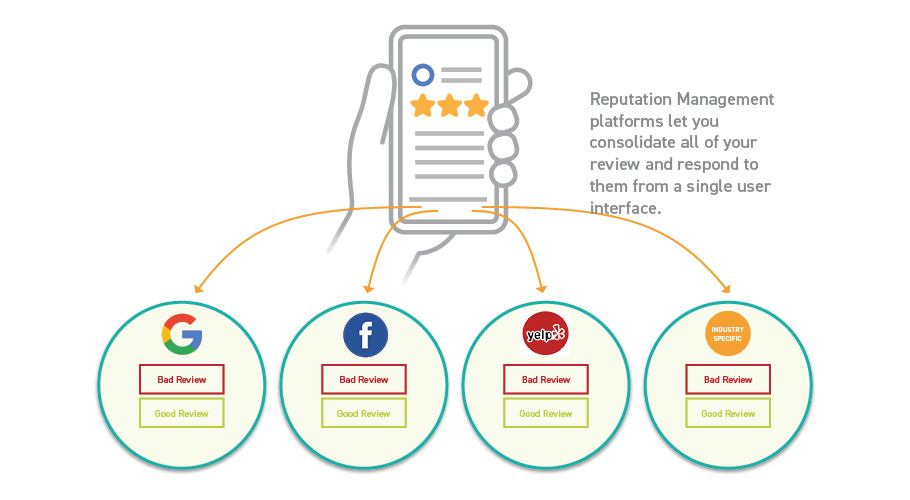Practicing online reputation management and using reputation management software is nothing new. Millions of service-oriented companies like medical and dental offices, law firms, restaurants, retailers, roofers, and more have benefited from improved reviews and ratings by surveying customers and clients after each touchpoint and enabling them to quickly and privately address complaints as well as encouraging fans through links to post positive reviews publicly.
In this edition of Plain Talk, we’ll provide online reputation management tips by addressing the four most common questions that we regularly hear from clients and colleagues.
- Understanding Online Reputation Management
- Reputation Management Software
- 4 Common Online Reputation Management Questions
- Got more questions?
Before we delve into common questions, it’s probably best to summarize what reputation management is and what reputation management software does. We developed the two diagrams below to quickly explain what it does for clients.
Understanding Online Reputation Management
According to Gartner, reputation management is “the practice of influencing stakeholder perceptions and public conversations about an organization and its brands. It includes monitoring perceptions and conversations, responding to reputation threats and proactively seizing opportunities to boost reputation.” The practice of reputation management can include public relations, crisis planning and crisis management but most commonly evokes conversations about reviews and social media engagement. Online reputation management involves monitoring, influencing, and maintaining an individual’s or organization’s public perception on the internet to ensure a positive and accurate representation.
Reputation Management Software
First, it allows you to survey customers after each identified point of interaction and determine their satisfaction. Dissatisfied customers are identified and contacted immediately and privately—thus preventing negative reviews. Satisfied customers are thanked and encouraged to click a link to the review platform of their choice and share their positive experiences. In essence, you are soliciting positive reviews. This practice is sometimes called review gating or “cherry-picking.”
Second, it enables all your reviews to be viewed and managed from a single interface. This includes reviews on social media platforms, Google, other general review platforms, and even industry-specific review platforms like those common in healthcare. This way, you’re not overlooking anything and are certain that all reviews are answered.
4 Common Online Reputation Management Questions
Now that you have a basic understanding of reputation management, let’s investigate the misconceptions and address each one.
1. Should I only solicit reviews when I want them?
In our previous article, Your Brand is Naked, we address how much less control we have over our brands in the age of the internet, where any video or review can go viral. For this reason, every interaction we have with a customer has the potential to be our most impactful one. Customers don’t just go to review sites when we tell them they should or can. They go when they want to. Just like in any other personal relationship, we don’t get to control how our customers feel or when they’re mad. That’s why we need to survey our customers every time we interact with them. After every appointment? Absolutely!
It’s often the desire of a company to determine when an endpoint is, when a culmination of services from the company’s perspective is, and to only survey the customer or client at this point. That can be irresponsible and dangerous! Let’s say you run a medical office, and your patient has a medical procedure that requires multiple appointments. Is it smart to wait until the end of treatment to survey them? No. What if reception is rude to them on the first visit? What if they experience unexpected pain after the first part of a two-part procedure?
The same advancements in technology that allow them to tell the world via a negative review about their bad experience allow you, the provider, to ask them how they feel! So, ask them. If they say something negative, call them. If they say something positive, connect them to your most important review site. As silly as this sounds, when people are picking a service provider, like a lawyer, they like reading about positive experiences clients had. Plus, mass matters. The more positive reviews you get, the better your reputation will look to prospective clients.
2. Can I control the flow of reviews?
While you can’t stop reviews from happening, you can certainly accelerate the heck out of reviews by soliciting positive reviews from positive survey responses. It’s kind of a no-brainer! In the world of reviews, the mass of positive reviews does three things:
a. It buries any older negative reviews, which will eventually only be able to be found by sorting the number of stars.
b. It dilutes the negative reviews by significantly decreasing their ratio to positive reviews.
c. It significantly improves your overall average star rating by piling on good reviews.
When performing competitive reputation audits for clients, we cannot only determine which competitors are effectively using reputation management solutions, but we can also usually tell exactly when they implemented the solution. When viewed on a timeline, the point of implementation is usually dramatically obvious.
3. Are reviews really that important to Google?
Search Engine Journal notes, “Customer reviews are a powerful indicator of the standing a local business maintains within its community. After all, who better to advise Google of the worth of a business than its customers?”
Google weighs the number of reviews, average rating, company response rates and key search terms in reviews when determining local positioning, especially in Map Pack. So, reviews are very important to Google, particularly in local searches. A good SEO manager will align your office locations and reputation management solution, ensuring local reviews appear for each location. In this regard, having a reputation management solution in place can be critical to your local search positioning. A good SEO manager may even set review quantity targets to help attain or maintain a SERP position.
4. Does Google penalize solicited reviews?
While Yelp has always been strict about review gating, it has long been public opinion that despite their public policy, Google has been neutral on review gating through reputation management solutions for years. Policy caught up with opinion on August 22, 2022, when Chris Silver Smith first noticed that Google quietly removed their anti-review gating verbiage from their policy documents. Specifically, they removed the line, “Don’t discourage or prohibit negative reviews or selectively solicit positive reviews from customers.” That’s kind of huge! So, while Yelp today remains strict about review gating, they are only growing their reviews by 9% – a stark decline from 2014, when they were growing their reviews by 98%! While you can use your reputation management solution to monitor and respond to Yelp reviews, use the survey/review gate only for Google, social media, and industry-specific review sites where it’s permitted.
Got More Questions?
If you have any questions about review and reputation management solutions, please give us a call at 502-499-4029 or drop us a note here, and we’ll be happy to help. Like what you read today? If you’re not already a subscriber to our Plain Talk newsletter, you can subscribe below.




